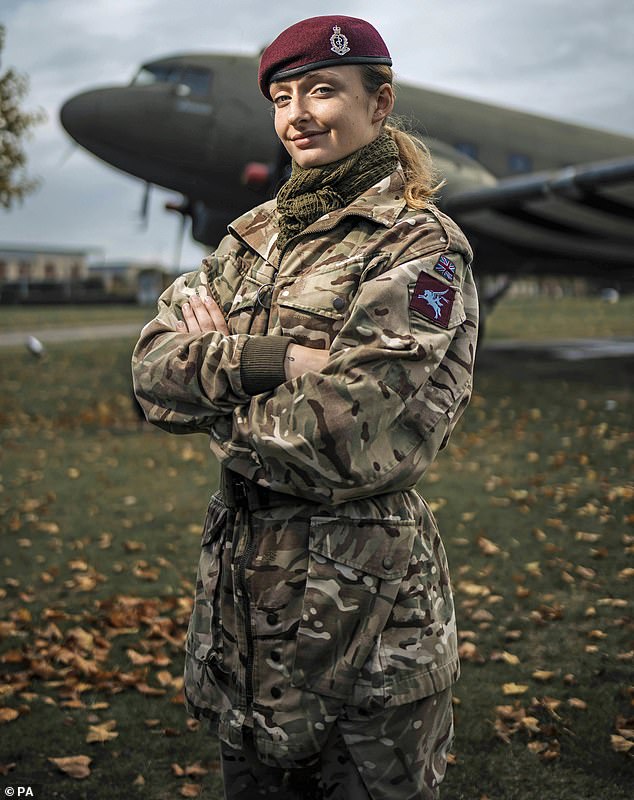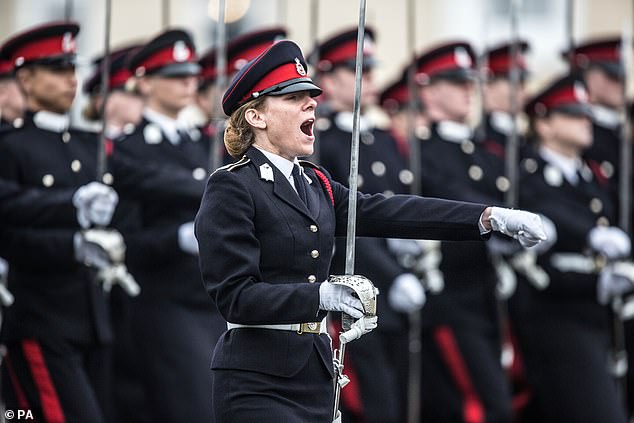Female recruits must pump iron and bulk up if they want to serve on front line, Army says
- Study shows that women in infantry units experience more injuries than men
Female Army recruits have been told to start pumping iron and bulk up if they want to serve on the front line.
A major new study by Army fitness chiefs found that women hoping to serve in infantry units - known as close combat roles - 'experience a higher rate of injury than men,' and are more susceptible to bone fractures and hip injuries.
As a result, the Army study says that men and women may need to undergo different training regimes, with women requiring additional strength training to bring them up to the required level.
The Army allowed men and women to serve together in all roles - including infantry and SAS - since 2018. At the time, the then-defence secretary Gavin Williamson said that the Armed Forces 'will be determined by ability alone and not gender.'
Commanders have shied away from having different levels of training for men and women - insisting there must be no lowering of standards for women who want to serve in combat units.

Female Army recruits have been told they must pump iron and bulk up if they want to serve on the front line (file photo)

Women hoping to serve in infantry units - known as close combat roles - 'experience a higher rate of injury than men,' a study showed (file photo)
But a new report, published in Soldier magazine, found that 'fewer women than men can reach the physical employment standards for ground close combat roles after three months of periodised strength and aerobic training, suggesting different strategies may be required to maximise performance of both sexes.'
The study, based on 66 research projects in the last eight years, also found female recruits suffer hip injuries marching alongside men because 'servicewomen are typically shorter than men' and 'overstride'.
Professor Julie Greeves, the Army's top physiologist, said additional training was required for women.
She said: 'Women are not going to get stronger by accident - they need more consistent training because they don't have the same levels of testosterone, the stimulus for muscle growth.'
Almost 50 percent of female recruits who join up hoping to serve in one of the front line units fail to complete the course, often because of the physical training demands, Ministry of Defence figures reveal.
There are currently only around 100 female soldiers serving in the infantry, where troops are expected to be able to carry heavy loads in excess of 50lbs while undertaking long marches across arduous terrain.
In 2020, Capt Rosie Wild, 34 , became the first woman to pass a gruelling Parachute Regiment entry test since the regiment was created in the Second World War.
She was described as a 'trailblazer' after passing the P Company course - which many men fail. But the numbers of women serving in the infantry has remained very low.
Women are allowed to serve in every frontline unit, even those which have the most physically demanding selection courses, such as the Parachute Regiment, the Royal Marines and the Special Forces.
But they have to pass the same tests as their male colleagues even though many lack the physical attributes, such as muscle mass to meet the grade.

Women are allowed to serve in every Army frontline unit, but are required to pass the same tests as their male counterparts even though many lack the physical attributes to meet the grade (file photo)
The new Army study, called Optimising the Health and Performance of Women in Ground Close Combat Roles, found female recruits have the best chance of making the grade if they build muscle through resistance training with weights and then eating 30g of protein after every workout.
Professor Greeves said: 'We took muscle samples and found that during the early stages of resistance training, men gained strength by developing more muscle, but women did so by using more of the muscle that they already had.
'It means women need to train more consistently and for longer periods, to gain and keep that muscle mass.
'My key advice is for female personnel to undertake regular, progressive and heavy resistance training alongside their cardio exercise. Anyone who doesn't do this will struggle to pass their fitness tests and they maybe more prone to injury.'
Army physical training instructor Charlotte Spence said: 'Some women worry they're going to be heavier as a result of resistance training - and you might be, but you will be leaner.'
Last night, Colonel Philip Ingram, a former Army intelligence officer, said: 'Military fitness training and testing has been designed for men and by men. It hasn't taken into account the physiological differences there are between men and women.
'All roles in the military are now open to women so I'm not surprised additional fitness strategies specifically for women to get them ready for male orientated tests are needed.'





































































































































































































































































































































